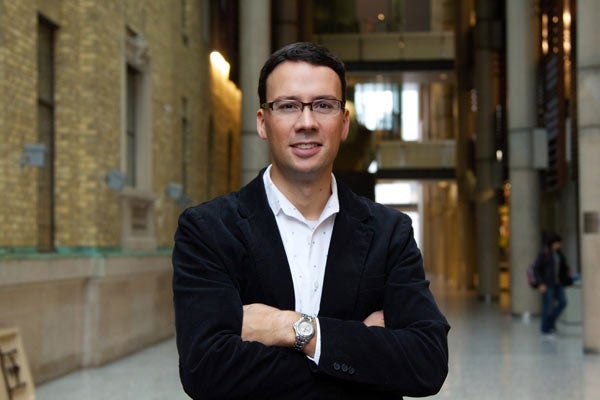
Dave Sinton is a mechanical engineer. So why is his lab full of algae?
Published: June 11, 2013
David Sinton’s research has always focused on the small-scale plumbing known as fluidics—the movement of fluid at the micro- and nano-scale— traditionally used in biomedical applications.
His early work in energy focused on fuel cell technologies and sensors that combine fluidics and optics. But, while on a sabbatical in 2009, he started thinking about how the tools of fluidics and optics could be applied broadly to sustainable energy challenges.
“The first thing that struck me about energy is that it’s so big. In terms of scale, it’s the biggest problem we have. I’m a small-scale fluids guy, so it wasn’t an obvious fit. Certainly not every energy challenge needs a guy like me. I had to think about where I could have impact.”
He arrived at photosynthesis.
“The largest energy process on earth is accomplished at small scales, through light and fluid interactions in plants and photosynthetic microorganisms distributed all around the world.”
If it’s been a long time since high school bio, here’s a refresher: plants (and some creatures like bacteria) convert sunlight into energy. Sunlight + carbon dioxide + water = oxygen and energy (in the form of sugars).
After making the connection between small scale fluids, optics and photosynthesis, Sinton started working with microalgae. The type of algae we see in ponds and puddles has great potential to generate fuel from solar energy.
“In terms of fuel production per area, you can do a much better job growing algae than you can with traditional biofuels,” he explains.
Sinton is the recipient of a $100,000 McLean Award which will help advance his work in sustainable energy. The prestigious award honours emerging leaders in basic research in the fields of physics, chemistry, computer science, mathematics, engineering sciences and statistics. The award is jointly funded by a gift from U of T alumnus William McLean and U of T’s Connaught Fund.
Created from the 1972 sale of Connaught Laboratories, which first mass-produced U of T’s Nobel award-winning discovery of insulin, the Connaught Fund invests close to $4 million annually in emerging and established scholars at U of T.
“Professor Sinton exemplifies the spirit of the Connaught Fund,” says Judith Chadwick, U of T’s assistant vice- president (research services). “Connaught is dedicated to supporting researchers who are targeting unmet societal ends and who have the potential to make a transformative contribution. On behalf of the University of Toronto, I extend my congratulations to him on this well-deserved award.”
The engineering challenge Sinton is embracing is that current photobioreactors used to grow these algae haven’t been developed far enough to have impact.
“Feasible generation of solar fuels from algae will require engineered photobioreactors that can pack the algae in and keep them happy," Sinton says.“The McLean award is going to help us maximize productivity. We have to really cater to these microorganisms to make them productive.”
Algae, it turns out, are finicky.
“They want certain wavelengths of light, intensities of light and light/dark cycles. They want sufficient concentrations of carbon dioxide, which is their food, and they won’t tolerate too much oxygen.”
Sinton’s group is engineering photobioreactors that cater to the algae, in as small a space as possible, and as inexpensively as possible. Energy technologies are evaluated based on cost, and low-cost fuels will require productive, high density photobioreactors.
“The McLean award is a tremendous honour,” he says. “I’m thrilled that our group’s work has been recognized with this award.”
 The group he refers to is a team of students and postdoctoral researchers who run experiments on algae and in Sinton’s other main research area—the small scale plumbing challenges of storing carbon dioxide underground, and reducing the carbon-footprint of traditional oil recovery processes.
The group he refers to is a team of students and postdoctoral researchers who run experiments on algae and in Sinton’s other main research area—the small scale plumbing challenges of storing carbon dioxide underground, and reducing the carbon-footprint of traditional oil recovery processes.
Noted for his devotion to training the next generation, Sinton is passionate about his students’ careers.
“Today,” he says, “we had the idea to celebrate the McLean Award with a McLean McCelebration McDonald’s McPicnic. It was atypical for us and good fun.”



